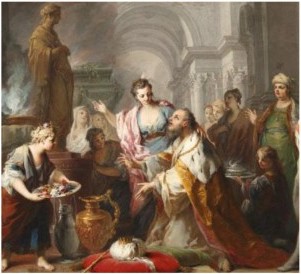0970 BCE The most senior and noble of David’s remaining sons (son of an Aramaean princess from Geshur 2Sam3:3, the only one of David’s sons of royal blood, since Amnon had been killed by him for raping their sister Tamar), Absolom enjoys popular support, rises against David, and David flees Jerusalem, but not before installing his ally Hushai as a disinformant “adviser” to Absalom. Absalom takes over David’s harem (now there’s no turning back). David deploys Ittai and 600 Philistine mercenaries (2Sam15). Hushai discredits Achitophel; Absalom is defeated at Gilead, and is killed by Joab, whom David executes for not dealing “gently” with Absalom. David is restored, then executes all of Saul’s male descendants. The next in line of David’s sons, Adonijah, proclaims himself king (1Kings 1:5-8). Nathan reports Adonijah’s actions to Bathsheba, who convinces the senile David to authorize the crowning of her son, Solomon, in a surprise ceremony orchestrated by Nathan, Zadok and Benaiah (1Kings 1:38-40).

Uxorious Solomon worships a foreign god
0967-0928 BCE Solomon - Legends are written into Scripture of the Queen of Sheba and Solomon’s reign as a “golden age,” stretching from the Euphrates (?!) to the Egyptian frontier. Solomon is reputed to be wealthy, powerful, and wise.
But is he “wealthy”? Cash flow problems force him to sell twenty cities in Galilee to the Phoenician king of Tyre (1Kings 9:10), and there are no trade items in Solomonic ruins.
Is he “powerful”? He is constantly troubled by Hadad of Edom, Rezin of Damascus, and Jeroboam of Ephraim (1Kings 11:10), his adversaries sent by YHWH “because his wives had turned Solomon’s heart to other gods” (priestly self-justification).
Is he “wise”? He used forced labor and other despotic practices that caused the kingdom to break into two immediately after his death (1Kings 12:1). Furthermore, he is not mentioned in any non- Judean sources. Religiously, Solomon had broken the mandate of the Torah by marrying foreign wives, and worshipping and building shrines to the Moabite and Ammonite gods (1Kings 11:1-13).
Why then is he so represented? Again, it is because he is credited with building the Temple and establishing the Zadokite sacerdotal ascendancy, so he is a hero to the priests, who later edit and write the Scriptures. He succeeds David as king, and forms diplomatic alliances through marriage. He builds the First Temple on Mt. Moriah, which becomes the only acceptable location for sacrifice, thereby granting a religious monopoly to the Zadokites. Chronicles ignores the issue of Solomon’s accession by having David designate him as his successor, and omits all unseemly circumstances, such as the attacks by Hiram of Tyre, Hadad, Rezin, Jeroboam, forced labor, and Ahijah’s prediction that Jeroboam would rule.
~~~~~~~~

